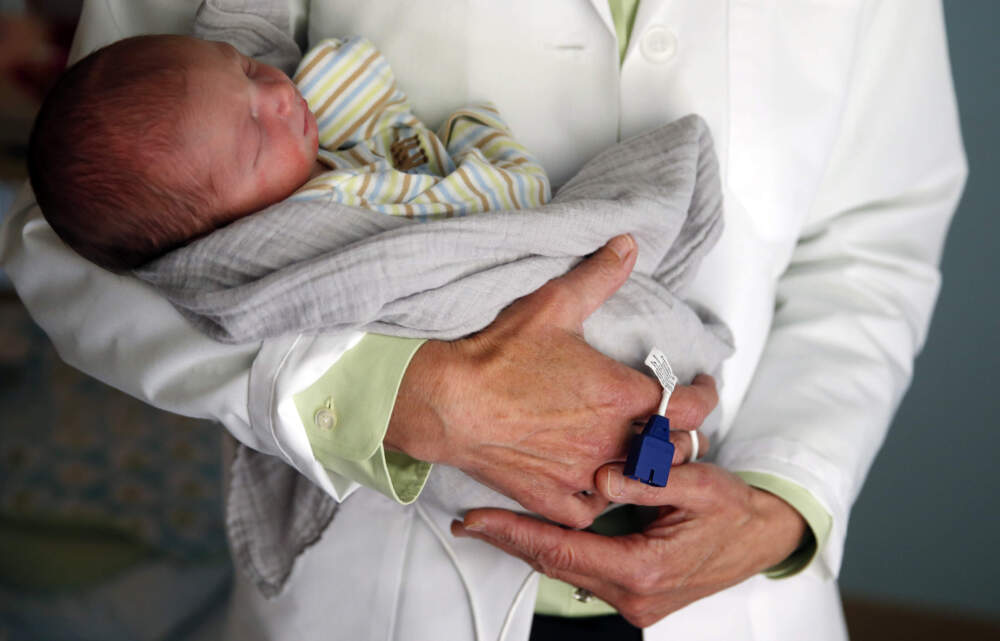Advertisement
Some Mass. hospitals stop infant welfare reporting based solely on drug dependence

Mandatory reporting of babies born dependent on a drug their birth parent was taking may be coming to an end in Massachusetts.
Mass General Brigham, the state’s largest hospital network, is joining Boston Medical Center in revising its policy. Now, instead of relying on an infant’s blood test results, hospital staff will only report a baby to state investigators if there’s concern about an imminent risk of abuse or neglect.
Mass General Brigham leaders said the change is allowed under state law. The state’s mandatory reporting requirement says the Department of Children and Families must be notified if a child is injured by, among other things, dependence on an addictive drug at birth. Current interpretation of the law has led most hospitals to file child welfare reports for newborns dependent on drugs such as opioids.
The reporting requirement has come under increasing scrutiny during the drug overdose crisis, in part because women report stopping medications like buprenorphine or methadone, which are used to treat addictions, during pregnancy. They say they fear traces of those medications in their newborns could cause them to lose custody of their babies.
“The goal here is balancing the safety of infants and families,” said Dr. Sarah Wakeman, senior medical director for substance use disorder at Mass General Brigham. “A positive toxicology test does not tell you anything about someone’s ability to parent. Actually, a positive buprenorphine test tells you this person is engaged in treatment.”
Legislation that would amend the state’s reporting requirement moved from one committee to another last week on Beacon Hill. It would direct the state Department of Public Health to write new regulations about drug dependence and child welfare reporting at birth, and require health officials to design plans aimed at helping parents managing an addiction.
"A positive toxicology test does not tell you anything about someone’s ability to parent. Actually, a positive buprenorphine test tells you this person is engaged in treatment."
Dr. Sarah Wakeman, of Mass General Brigham
Some supporters of the bill say faster progress is needed. Fatal overdoses during and shortly after a pregnancy more than tripled nationwide between 2018 and 2021.
Massachusetts Child Advocate Maria Mossaides said in an email she shares the concern that mandated reporting can “exacerbate fear and stress” for parents of newborns. But Mossaides said she also worries about policies that vary from one hospital to the next.
“Massachusetts needs a comprehensive approach to address these cases,” Mossaides wrote. “Passing this legislation is crucial.”
The Healey administration said it needs to review the changes Mass General Brigham and Boston Medical Center are making.
“We are committed to reducing stigma and promoting health equity, especially for those affected by substance use disorder,” said a spokeswoman for the Executive Office of Health and Human Services in an email. “Substance exposure alone does not automatically equate to abuse and neglect, and we will continue working with the advocacy community to determine what support an individual needs and how they can best access them.”
Mass General Brigham announced its policy change in a written statement Tuesday. Boston Medical Center quietly revised its guidelines for reporting suspected abuse and neglect in May 2021.
“BMC staff are directed to report suspected abuse only after a child is born and if they have concerns about the parent’s ability to safely care for the child,” said spokesman David Kibbe in a statement. “BMC continues to advocate for reforms to state law that allow all pregnant people statewide to be treated with equity and compassion.”
Mass General Brigham said changing its child welfare reporting guidelines is part of a larger effort to eliminate racism in the health system. Several studies have documented higher drug testing rates for Black newborns compared to white infants, and Black babies are more likely to be reported for alleged abuse and neglect.
Mass General Brigham's new policy takes steps to limit drug testing for newborns and require written consent for testing pregnant people and infants outside of emergency situations.
“The updated policy reflects our focus on providing safe and equitable care for all patients,” said Dr. Allison Bryant, Mass General Brigham’s associate chief health equity officer, in a statement. “The process allowed us to turn our lens to understand our own contributions to stigma and inequity and strive to fix them.”
